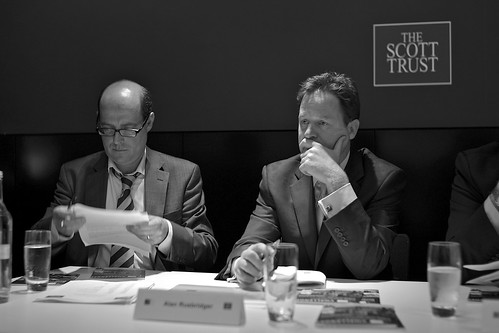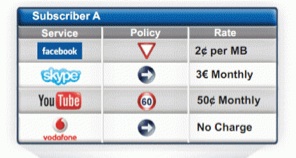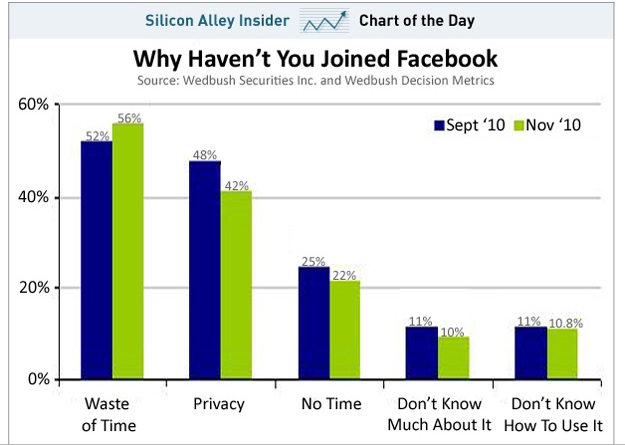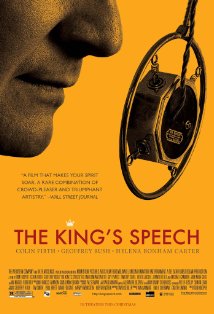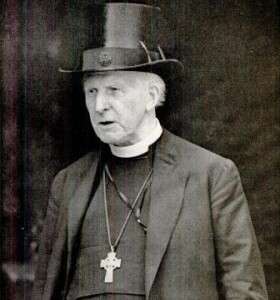Nick Robinson and a chap whose name I can’t quite remember. Photographed on June 15, 2009.
A letter from Woz
Lovely open letter on Net Neutrality from Steve Wozniak in The Atlantic. Some snippets:
To whom it may concern:
I have always loved humor and laughter. As a young engineer I got an impulse to start a Dial-a-Joke in the San Jose/San Francisco area. I was aware of such humor services in other countries, such as Australia. This idea came from my belief in laughter. I could scarcely believe that I was the first person to create such a simple service in my region. Why was I the first? This was 1972 and it was illegal in the U.S. to use your own telephone. It was illegal in the U.S. to use your own answering machine. Hence it also virtually impossible to buy or own such devices. We had a monopoly phone system in our country then.
The major expense for a young engineer is the rent of an apartment. The only answering machine I could legally use, by leasing (not purchasing) it from our phone company, the Codaphone 700, was designed for businesses like theaters. It was out of the price range of creative individuals wanting to try something new like dial-a-joke. This machine leased for more than a typical car payment each month. Despite my great passion and success with Dial-a-Joke, I could not afford it and eventually had to stop after a couple of years. By then, a San Francisco radio station had also started such a service. I believe that my Dial-a-Joke was the most called single line (no extensions) number in the country at that time due to the shortness of my jokes and the high popularity of the service.
[…]
I frequently speak to different types of audiences all over the country. When I’m asked my feeling on Net Neutrality I tell the open truth. When I was first asked to “sign on” with some good people interested in Net Neutrality my initial thought was that the economic system works better with tiered pricing for various customers. On the other hand, I’m a founder of the EFF and I care a lot about individuals and their own importance. Finally, the thought hit me that every time and in every way that the telecommunications careers have had power or control, we the people wind up getting screwed. Every audience that I speak this statement and phrase to bursts into applause.
[…]
We have very few government agencies that the populace views as looking out for them, the people. The FCC is one of these agencies that is still wearing a white hat. Not only is current action on Net Neutrality one of the most important times ever for the FCC, it’s probably the most momentous and watched action of any government agency in memorable times in terms of setting our perception of whether the government represents the wealthy powers or the average citizen, of whether the government is good or is bad. This decision is important far beyond the domain of the FCC itself.
And here’s a nice illustration of why this really matters.
Mark Anderson’s Predictions for 2011
Mark Anderson is one of the most perceptive observers of the technology business that I know. Every year he issues his predictions for the next 12 months. Here’s the current batch.
# The Smartphone Market Breaks in Two: Secure / enterprise, vs. consumer / entertainment.
* Android dominates – and balkanizes – the consumer Smartphone Market, with Apple close behind offering its Monolithic Operations.
* RIM and XX dominate the Enterprise. XX should be Microsoft, but Apple gets it.
# Carriers Grab Power: Google has interrupted a transition of power from Pipes to Boxes. Android gives carriers power, while the iOS takes it away. Whose walled garden do you prefer? Pray for Apple, if you are a user.
# iTunes Seeds Its Own Competition: More real distribution competitors grow and prosper. Consumers want choice. This is a major business opportunity, on a global scale.
# The Micro-App Ecosphere Hits a Money Wall: Prices quickly escalate, and suddenly there are two types of micro apps companies: big ones that charge and survive, and cute little ones that don’t.
# Google Loses Its Way, failing to answer the critical question: “What Business Am I In?” even as Android, Google Phone, and e-ditions prosper (mostly without revenues). The company will be perceived as confused and unable to develop or support long-term strategy. Is this death by a thousand profitless successes?
# The Year of the Electric Car, Part II: Real Production Numbers, Real Sales Numbers, Real Charging Stations Popping Up Like Weeds. Cars regain technology interest as a technology platform, fueled by burgeoning global sales growth, new nationalist entries, and all-electric models.
# SNS CarryAlongs Remain the Fastest-Growing Segment in Computer Sales: We will see LOTS of new (9” x 7”) pads this year.
# Data Matters: Oracle, the world’s largest database company, Takes Off, and emerges as a global platform. Competitor SAP suffers. The Larry Ellison/Mark Hurd team becomes as legendary as Gates and Shirley once were, and for the same reason: the ideal match of tech visionary with operating maven.
# NetTV Is In, Cable Is Out: Penetration of IPTV use in the U.S. reaches 40%+. This marks a revolution in mass media. Cable and satellite suffer, and are wrong about customers not “cutting the cord.” Netflix benefits, and dominates the IPTV space, creating a breakout play for an already-amazing storybook company. Carriers (and countries) not providing real broadband suffer competitively. Old content players realize it is Dominate or Die in the new IP distribution world. New channels, and definitions of channels, abound.
# E-books Go Mainstream: While paper book sales remain healthy, e-book fractional share of all book sales goes ballistic. E-reading becomes as common as eating with a spoon. U.S. wholesale e-book sales should meet or exceed $160MM per quarter during 2011. Compound Annual Growth Rates will remain over 140%.
Cobwebbed
Facebook: resistance is not futile, apparently
[Source]. What’s interesting is that the “waste of time” brigade seems to be growing.
Google extends definition of ‘docs’ to include video
Hmmm… Just read this. Google’s encouraging me to upload my video files to Docs. Uploaded video files can be up to 1 GB.
These are the most common video formats that you can upload and play:
* WebM files (Vp8 video codec and Vorbis Audio codec)
* .MPEG4, 3GPP and MOV files – (h264 and mpeg4 video codecs and AAC audio codec)
* .AVI (many cameras use this format – typically the video codec is MJPEG and audio is PCM)
* .MPEGPS (MPEG2 video codec and MP2 audio)
* .WMV
* .FLV (Adobe – FLV1 video codec, MP3 audio)
I can understand why people might want to use Docs for private videos, or ones to which they wish to restrict access to selected friends and family. But for public stuff, why not use YouTube — also a Google property?
10 Digital Music predictions for 2011
Interesting post by Luke Lewis.
Here are the ones that struck me:
Worth reading in full. The most controversial one is his conclusion that the Spotify business model isn’t sustainable. I’m not convinced.
Thanks to Caspar for the link.
LATER: Interesting email from a reader re my comment about Spotify:
Maybe Spotify and streaming is not the future. I’ve been a paid subscriber to Spotify for over a year and have just discovered that half of my playlists and downloaded tracks have been removed owing to ECM pulling out (Naxos are rumoured to be next to go). Ironic as well over a third of my CD and LP collection is ECM and the last three CDs I have bought (within the last three months) are all ECM.
Keeping a record
This morning’s Observer column.
A few months ago, I went to an intriguing talk given by Lorcan Dempsey, who is a leading authority on the role of libraries in the digital world. One of the slides in his presentation really made me sit up. The context was an account of how different academic libraries are going about the archiving of digital material. The slide in question focused on Emory University, a wealthy, private research university in Atlanta, Georgia. Like many such institutions, it has been buying up the papers of well-known writers and already has a fine collection of Irish scribblers in its archives. But it also has the papers of Salman Rushdie and this was the subject of the slide that startled me.
Why? Because it showed that Emory’s Rushdie archive included not only the writer’s papers, but also his old computers and hard drives. And there, on the slide, was the symbol for an old Apple Macintosh computer and in its directory listing was a folder entitled, simply, “My Money”. And at that moment, if you will forgive the pun, the penny dropped…
There are also some good (critical) comments by readers.
The bibliomaniac’s delight
Just stumbled on a delightful site — Bookshelf Porn — via a tweet. Not at all what you’d expect from the name. Just a glimpse of the infinitely-varied ways people have of storing their books. It’s truly amazing what one finds on the Web.
The King’s Speech
We went to see The King’s Speech last night. I thought it was terrific — beautifully acted, cleverly written and surprisingly moving. Colin Firth gives a great performance as the stammering monarch-to-be but what really blew me away was Geoffrey Rush’s rendition of Lionel Logue, the speech therapist who gave him his voice. (Helena Bonham-Carter is also good as Elizabeth Bowes-Lyon, but her performance isn’t in the same league as that of the two men.)
One small, cavilling point. The film claims to be based on a true story — of how a rough Antipodean diamond of a speech therapist enabled a shy stammerer to carry out his public duties. But Derek Jacobi portrays Archbishop Cosmo Lang — who played such a pivotal role in the Abdication crisis — as an odious little creep. I’m perfectly prepared to accept that senior prelates can be odious creeps (as a former Irish Catholic I could give you a long list of same), but Lang seems to have been a more complex character than Jacobi’s performance allows. For example, the Wikipedia entry on him claims that he denounced Mussolini’s invasion of Abyssinia and was outspoken about European anti-semitism. On the other hand, Wikipedia also claims that he supported the appeasement policies of the Baldwin and Chamberlain administrations.
The real Cosmo Lang.
Whatever else, Lang was right about the odious Edward VIII and his manipulative floozy (magnificently rendered in the film by Eve Best). A Life magazine profile of him published in 1939 records that in October 1936 he and the Archbishop of York “respectfully requested to be permitted to decline” a Royal invitation to a dinner at St. James’s palace at which Wallis Simpson was to be present. Later, Lang threatened to withhold communion from Edward if he married her. Eddie is reported to have retorted: “Please remember that I am the head of your organisation”. The magazine also goes on to reveal something startling: that on November 17, while the great British public was still completely in the dark about what was going on, Lang presided over a secret session of the House of Lords to discuss the crisis. (Hmmm… I wonder about that: surely the ‘speaker’ of the Lords at the time would have been the Lord Chancellor.)
The IMDB entry for the film notes one ‘goof’: in a scene set in 1934 Bertie (then still Duke of York) refers to “Marshal Stalin”. However, says IMDB, “Joseph Stalin was appointed Marshal of the Soviet Union almost 10 years later, in March 1943.”
The trailer for the film is here. Hope you enjoy it as much as we did.
On reflection… Another thought. Given that it’s supposed to be a true story, the film’s portrayal of Winston Churchill’s role in the Abdication crisis seems misleading. The impression is given that Churchill — played by a smouldering cigar ably brandished by Timothy Spall — was firmly behind Bertie and — by implication — implacably hostile to Eddie. But that wasn’t the case. For example, he and Lord Beaverbrook, the newspaper proprietor, were in favour of allowing the King to put his case (for being allowed to marry Wallis) to “the people” via a radio broadcast. This idea was blocked by the Cabinet, on the grounds that it would undermine the principle of a constitutional monarchy (which is that the only body entitled to decide these matters is Parliament).

